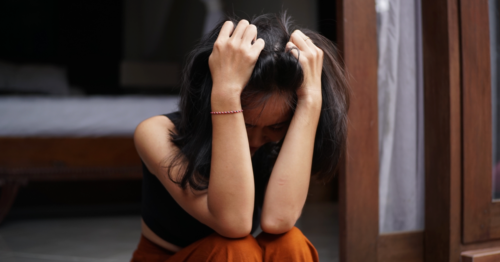
Table of Contents
How Charlie Health Supports Survivors of Suicide Attempts

Written By: Ashley Laderer

Clinically Reviewed By: Dr. Don Gasparini
August 18, 2023
8 min.
Surviving a suicide attempt opens the door to a second chance at life, but it also signifies the beginning of a challenging mental health journey. Keep reading to learn how Charlie Health offers suicide attempt survivors the compassionate care needed for recovery.
Learn more about our Clinical Review Process
Table of Contents
Suicide attempts and death by suicide are tragically common amongst teens and young adults; suicide is the second leading cause of death of people ages 10 through 34, CDC data from 2021 shows. Further research has shown that 8.9% of high school students attempted suicide the year they were surveyed –– a number that is even higher for marginalized groups like Black and LGBTQIA+ students.
People who survive their suicide attempts get a second chance at life –– but that’s not to say it will be smooth sailing. While surviving a suicide attempt opens the door to new opportunities, it also signifies the beginning of a challenging journey toward well-being. To truly embrace this second chance, survivors need compassionate mental health treatment to address the underlying challenges that got them to this point.
One such option is Charlie Health, a virtual intensive outpatient program (IOP) that supports young people who’ve survived suicide attempts and are dealing with other serious mental health challenges. Keep reading to learn how Charlie Health supports survivors, the kinds of therapy we use, and why IOP is well-suited for suicide-attempt survivors.
How Charlie Health supports survivors
As mentioned, Charlie Health offers IOP for teenagers and adults with serious mental health conditions who need more than once-weekly support. Our team of clinicians is experienced in providing intensive care to people with all sorts of mental health struggles, including those who grapple with suicidal ideation and those who have attempted suicide and survived. We understand that treatment during this time can be challenging, and we offer a variety of treatment modalities to support survivors, including:
Individual therapy
Individual therapy provides survivors the one-on-one support they need during this difficult time. Therapy helps people work through past trauma, address current struggles, and more. Qualified therapists use cognitive behavioral therapy (CBT), dialectical behavior therapy (DBT), and other treatment methods to help survivors understand their suicide attempt, their triggers, and how to cope with suicidal thoughts moving forward. Therapists can also help survivors develop safety plans, which are important following suicide attempts.
IOP groups
Group sessions bring together people who are facing similar challenges, such as suicidal ideation or a history of suicide attempts. These groups allow survivors to connect with others and help them remember that they’re never alone in how they feel. IOP group members can share their experiences in a safe, non-judgmental space. Not to mention, group members learn helpful coping techniques, such as DBT skills, which can be life-changing for people suffering from suicidal ideation.
Family therapy
Family therapy is a major component of Charlie Health’s IOP. With the help of a skilled therapist, family therapy helps all family members learn healthy communication and conflict-resolution skills, fostering a supportive home environment. For suicide attempt survivors, family therapy is a great way for family members to receive psychoeducation on suicide while learning invaluable ways to help their loved ones cope with mental health challenges.

Restoring hope for teens, young adults, and families.
Our virtual intensive outpatient programming is designed to meet you where you are and create long-term healing.
The core mental health conditions we support
Various mental health conditions can contribute to suicidal ideation and, ultimately, suicide attempts. Many people only associate suicide with depression, and although many individuals with depression struggle with suicidal ideation, other conditions can also lead to suicidal thoughts and a desire to end one’s life.
Some examples of these mental health conditions—all of which we support and provide virtual care for at Charlie Health—include:
- Anxiety disorders
- Depression
- Dissociative disorders
- Gender identity issues and dysphoria
- Mood disorders
- Personality disorders
- Self-harm
- Substance use disorder
- Trauma
Types of therapy at Charlie Health for suicide attempt survivors
Dialectical behavior therapy (DBT)
Cognitive behavioral therapy (CBT)
DBT helps suicide attempt survivors effectively manage emotions, navigate distressing situations, and improve interpersonal relationships through mindfulness, emotional regulation, distress tolerance, and interpersonal effectiveness skills.
CBT helps suicide attempt survivors identify and change negative thought patterns and behaviors through a therapeutic process that challenges distorted beliefs and fosters healthier coping mechanisms.
Charlie Health offers various therapy modalities for all individuals in our program. However, two types of therapy are the most studied and proven effective for suicidality: DBT and CBT. Charlie Health offers both of these kinds of therapy. Here’s what DBT and CBT therapy entail and how both treatments can help survivors.
Dialectical behavior therapy (DBT) skills
DBT is a type of therapy that helps people understand difficult emotions and learn how to regulate them effectively. This therapy integrates different techniques in group and individual settings, which can be invaluable for people struggling with depression, suicidality, self-harm, and more. The four main components of DBT are:
1. Mindfulness
Mindfulness helps people cultivate present-moment awareness and acceptance. This skill takes time to build, but with practice, it allows people to observe and detach from unhelpful thoughts and sensations without judgment.
2. Emotional regulation
People with mental health conditions and suicidal ideation may struggle to regulate their emotions. DBT skills related to emotional regulation teach people how to effectively identify and regulate any intense emotions they may experience. Emotional regulation skills minimize the impact of distressing emotions, including those related to suicidal ideation.
3. Distress tolerance
DBT therapists teach distress tolerance techniques that help people healthily navigate difficult emotions or situations (such as feeling suicidal) so they don’t resort to unhealthy coping mechanisms like self-harm or substance abuse. Distress tolerance skills are beneficial in times of emotional and physical distress and include paced breathing, muscle relaxation, and radical acceptance.
4. Interpersonal effectiveness
This aspect of DBT focuses on interpersonal relationships outside of therapy. People will learn assertiveness training, listening skills, social skills, and more. These skills improve their ability to work through conflicts, communicate their needs, build self-respect, and enhance relationships –– whether with friends, family, or romantic partners.
Cognitive behavioral therapy (CBT)
CBT, which is used in treating many different mental health conditions, is based on the idea that how we think, feel, and behave are interconnected. When engaging in CBT, people will learn to recognize their unhealthy, negative thought patterns, some of which may have been around for so long that they feel like second nature. After recognizing these unhealthy thought patterns and accompanying behaviors, people can start to make healthy changes.
Working with a skilled therapist, people learn to identify and challenge negative and distorted beliefs about themselves, their current circumstances, and their future. Through this process, people can better understand the factors that drive their suicidal ideation and ultimately cultivate healthier beliefs, behaviors, and coping mechanisms.
Other types of therapy for suicide attempt survivors
While DBT and CBT are both excellent treatments for suicide attempt survivors, Charlie Health also offers a variety of other treatment modalities that make for a well-rounded, holistic approach to nurturing mental health.
The following types of therapy may be included in a treatment plan for patients who are suicide attempt survivors:
- Art and music therapy
- Attachment-based family therapy
- Compassion-focused therapy (CFT)
- Dance and movement therapy
- Drama therapy
- Experiential therapy
- Exposure therapy
- Family support groups
- Motivational interviewing
- Relational therapy
- Yoga, mindfulness, and meditation
The exact treatment plan and types of therapy used will depend on an individual’s diagnosis, preferences, and treatment goals.

Why an IOP is ideal for survivors
An IOP is a great mental healthcare option for someone who has survived a suicide attempt because these people are considered high-acuity –– meaning they urgently need intensive care for their safety and well-being.
While traditional outpatient treatment usually involves one therapy session weekly, an IOP offers much more support and structure. Multiple sessions –– both individual and group –– are conducted throughout the week. IOP is a much higher level of care than traditional outpatient treatment and can offer the intensive support that a suicide attempt survivor needs.
Different therapy modalities, like previously mentioned, are used during these sessions. While not all IOPs include family counseling, Charlie Health’s IOP does incorporate family therapy since family involvement is a predictor of success for teens and young adults in an IOP.
In Charlie Health’s virtual IOP, a typical schedule involves:
- 1 hour of individual therapy every week
- 1 to 2 hours of family therapy every week
- 3 hours of group sessions 3 days a week
Many, if not most, people who have attempted suicide end up in the hospital, whether that’s the emergency room or an inpatient program. While survivors’ care during this time is crucial and life-saving, one’s treatment must continue outside of the hospital. For someone recently discharged from an emergency department or an inpatient hospitalization stay, IOP offers a step-down in care: intensive care without 24/7 full-time support. An IOP can provide structured treatment and resources for survivors to get back on their feet, learn invaluable skills, and prevent further mental health crises.
What other benefits are there to virtual care?
Charlie Health’s IOP is fully virtual. Telehealth therapy allows people to receive the care they need in their homes, with no wasted time or money driving or taking public transportation to appointments. This is also a major benefit for people living in healthcare deserts, where adequate mental healthcare providers or even primary care providers are unavailable nearby. In these cases, virtual healthcare can be truly life-saving.
Charlie Health’s IOP takes place in the evening. This way, clients can attend work or school during the day and then focus on their recovery in the evenings without spending extra time getting to and from treatment. Research conducted by Charlie Health found that attendance rates for virtual care were higher than the industry average. Those receiving virtual care through Charlie Health’s IOP attended 91% of scheduled sessions—much higher than the 65% industry average.
How Charlie Health can help suicide attempt survivors
To sum it all up, Charlie Health provides suicide attempt survivors with evidence-based, compassionate virtual care. Different therapy modalities (such as DBT and CBT) are used multiple times a week in individual and group settings to provide symptom relief and promote recovery.
Intensive outpatient programming, such as Charlie Health’s telehealth IOP, is between the level of care offered by traditional outpatient therapy and inpatient treatment—the sweet spot for many survivors looking to transition back into their lives in a healthier, safer way.
So if you or someone you know is a young adult or teen struggling with their mental health and could benefit from intensive virtual care, Charlie Health may be able to help.
To be sure if Charlie Health’s IOP is the right fit for you or your loved one, fill out this short form to learn more today.




